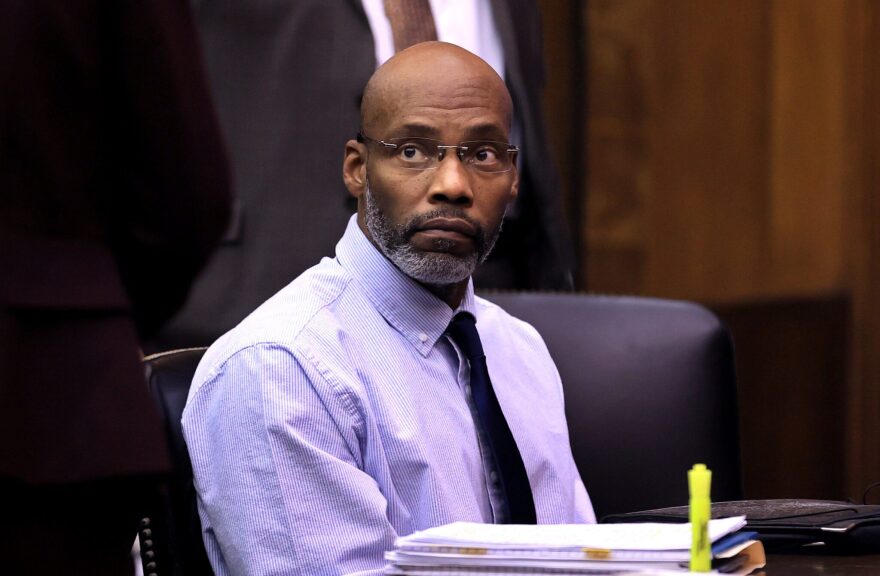A landmark hearing over whether Lamar Johnson’s 1994 murder conviction should be vacated wrapped up Friday after a week of often startling and illuminating testimony.
And while Johnson’s continued confinement rests with Judge David Mason, legal experts say the result could have implications for how Missouri handles wrongful conviction cases.
Mason has not indicated when he’ll rule on the case. But he did say that after attorneys provide him with briefs, he'll likely make announcement from the bench at some point.
Johnson was convicted in 1995 of murdering Marcus Boyd in St. Louis. He’s steadfastly maintained he was not one of two people who killed Boyd on his porch in 1994. On Thursday had an opportunity to make that case in court.
Before Thursday, the hearing featured a key eyewitness recanting his testimony that Johnson killed Boyd as well as James Howard’s claim on the witness stand that he was the person who was responsible along with Phillip Campbell.
One of the reasons why Johnson’s case is unusual is that the person trying to free him is St. Louis Circuit Attorney Kim Gardner. Her office’s Conviction Integrity Unit found in 2019 that Johnson was wrongfully prosecuted by one of her predecessors. And as special assistant circuit attorney Charlie Weiss noted earlier this week, Gardner is breaking new ground by trying to free Johnson.
“This is a rather historic moment before this court,” Weiss said. “This is the first time in the history of the 22nd Judicial Circuit where the court is hearing an actual innocence claim filed by a prosecuting attorney.”
There's a reason why it’s taken nearly three years for Gardner to get this case before Mason. The Missouri Supreme Court ruled that she didn’t have the authority to seek a new trial. And that compelled state lawmakers like Sen. Brian Williams to pass a new law in 2021 to help prosecutors vacate sentences.
Williams said the issue is personal for him. He says he could have been put in a similar situation to Johnson.
“It could be one situation where someone says you may look like or fit the description of someone and ultimately go to prison for the rest of your life,” said Williams, D-University City. “And to think how close to home that is for me and many other Black people in our state or country — we should be doing everything we can to right this wrong.”
Attorney general pushback
Under the new law, the attorney general’s office has an ability to get involved in a case where a prosecutor is seeking to vacate someone’s sentence. So far, assistant attorney general Miranda Loesch has argued that the people vouching for Johnson’s innocence have credibility problems or have made contradictory statements.
“At the end of this hearing, they’re going to ask you to believe convicted murderers and gang members — and we’re convinced that their evidence is not clear and convincing and they’re not credible,” Loesch said earlier this week.
Legal experts say it makes sense that the attorney general should be a part of this type of process. There could be a situation, for instance, where a prosecutor claims someone didn’t commit a crime when they actually did – and the attorney general’s office could be a check against that person being released.
But Jackson County Prosecutor Jean Peters Baker has been critical of how Attorney General Eric Schmitt’s office has handled these types of cases.
Baker was a key figure in getting Kevin Strickland released from prison last year, thanks to the law that Williams championed. She said getting Strickland out was difficult because of fierce pushback from Schmitt’s office.
“It is good policy to have some check on the local prosecutor as you go through this system,” Baker said. “Now a check shouldn’t mean a mallet.”
Washington University School of Law professor Peter Joy said the result of the Johnson case will “establish that the law on the books that allows this pathway for innocence actually is meaningful.”
“I know in the Kansas City area, one person's already been set free under this law,” Joy said. “And I think that just gives hope to people who have actual innocence claims, especially when these claims are ones that are uncovered by the prosecutor.”
Former Missouri Supreme Court Judge Michael Wolff said cases like Johnson’s are important for the credibility of the criminal justice system.
“So there are some people who are in prison who are innocent. We hope it's very few. But we know that a system like this can make mistakes,” Wolff said. “And evidence can come to light later that shows that somebody's innocent. And when that happens, the prosecutor whose duty it is, under the ethical rules, is to do justice, not just to secure a conviction, has a duty, I think, to bring this forward.”
Copyright 2022 St. Louis Public Radio. To see more, visit St. Louis Public Radio.






